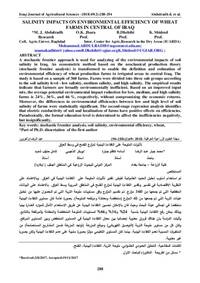Salinity Impacts on Environmental Efficiency of Wheat farms in Central of Iraq

Authors:
A stochastic frontier approach is used for analyzing of the environmental impacts of soil salinity in Iraq. An econometric method based on the neoclassical production theory (stochastic frontier analysis) is transformed to enable the definition and estimation of environmental efficiency of wheat production farms in irrigated areas in central Iraq. The study is based on a sample of 360 farms. Farms were divided into three sub groups according to the soil salinity level - low salinity, medium salinity, and high salinity. The empirical results indicate that farmers are broadly environmentally inefficient. Based on an improved input mix, the average potential environmental impact reduction for low, medium, and high salinity farms is 24%, 36%, and 66 %, respectively, without compromising the economic returns. Moreover, the differences in environmental efficiencies between low and high level of soil salinity of farms were statistically significant. The second-stage regression analysis identifies that electric conductivity of soil and localization of farms have positive effects on efficiencies. Paradoxically, the formal education level is determined to affect the inefficiencies negatively, but insignificantly.
